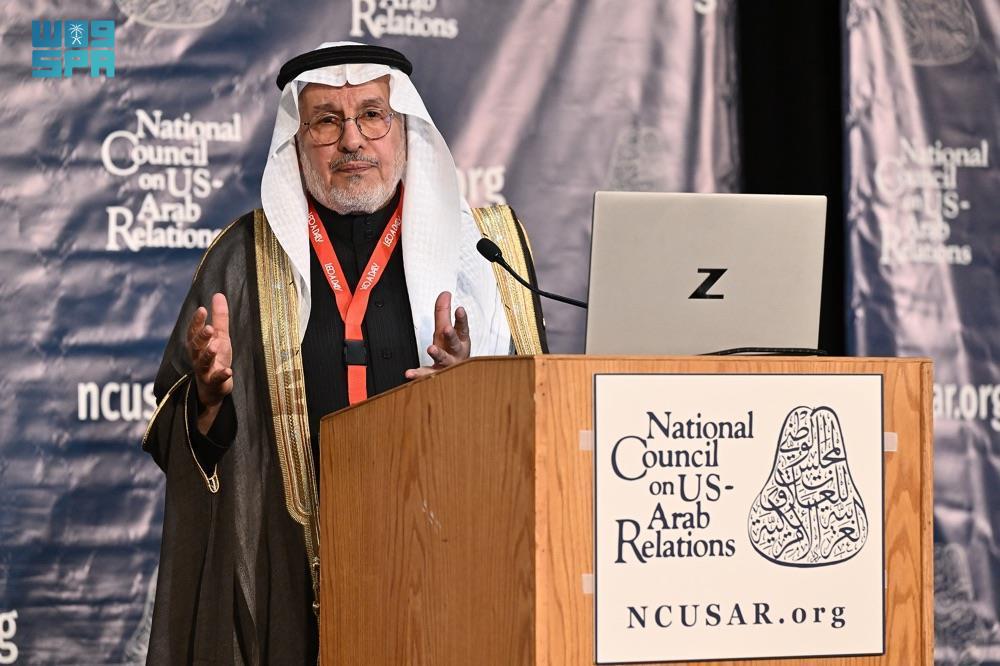KSrelief Supervisor General: Humanitarian Efforts Strained by Increasing Crises, Funding Shortages, Access Challenges

Washington, November 14, 2024, SPA -- King Salman Humanitarian Aid and Relief Center (KSrelief) Supervisor General Dr. Abdullah Al Rabeeah said the Kingdom of Saudi Arabia has provided $133 billion in humanitarian and relief assistance between 1996 and 2024, benefiting 170 countries.
Speaking yesterday in a meeting held here by the National Council on U.S.-Arab Relations on addressing global humanitarian challenges, he also highlighted that one of the most pressing challenges in humanitarian efforts is the escalating crises in countries like Lebanon, Palestine, and Sudan. These challenges are exacerbated by soaring administrative and logistical costs and a significant shortage of funding sources.
He added that the UN Humanitarian Response Plan for 2024 has secured only 37.5% of the necessary funds, totalling $18 billion, while the actual need exceeds $49 billion. Additionally, the limited number of donor countries, the effects of climate change that can cause natural disasters like earthquakes and floods, economic fluctuations stemming from events like the COVID-19 pandemic, access restrictions and threats to aid workers further complicate the humanitarian landscape.
He said that since its establishment in 2015, KSrelief has carried out 3,105 projects in 104 countries, totalling more than $7.1 billion in value. These projects span various vital sectors, with Yemen receiving the largest share—63.12% of the center’s total aid—amounting to over $4.5 billion.
He emphasized that KSrelief has initiated 1,017 projects to support women worldwide, benefiting more than 153 million women with a total value exceeding $674 million. He also noted that the welfare of children is a key priority in the center’s humanitarian efforts, as KSrelief has carried out 953 projects dedicated to children worth more than $909 million, benefiting over 181 million young individuals.
He noted that KSrelief has launched several initiatives to support the Yemeni people, including the Masam project, which has cleared over 468,000 landmines, and programs for providing prosthetic limbs and reintegrating children formerly associated with armed conflict into society.
He provided an overview of the Saudi Aid Platform, the Platform for Assisting Displaced Persons and Refugees, the National Volunteer Portal, the Electronic Donations Platform (Sahm), and the monitoring and documentation initiatives related to humanitarian work.
Regarding refugees in the Kingdom, Al Rabeeah said that Saudi Arabia is among the leading countries hosting refugees (referred to as visitors), with an estimated total of more than 1.1 million refugees in the Kingdom. These include over 561,000 Yemeni refugees, 262,000 Syrian refugees, and 269,000 Rohingya refugees from Myanmar. The Kingdom offers them access to free healthcare and education and emphasizes their integration into society.
On recent aid provided to some countries, he stressed that the Kingdom responded immediately following the outbreak of the crisis in the Gaza Strip, with total aid provided to the Palestinian people reaching $186 million. Saudi Arabia established an air bridge with 54 aircraft and a sea bridge with eight ships, and it also airdropped specialized food aid for those affected in Gaza to mitigate the impact of Israeli forces closing border crossings. This aid is still ongoing.
Al Rabeeah noted that Saudi Arabia allocated $120 million in aid for Sudan during its current crisis, establishing an air bridge with 13 aircraft and a sea bridge with 31 ships. Also, the Kingdom pledged $400 million in humanitarian aid to Ukraine to alleviate the suffering of those impacted by the country’s humanitarian crisis, with an air bridge of 21 aircraft.
He highlighted the Kingdom’s launch of the Saudi Sama’a Volunteer Program for Cochlear Implantation and Hearing Rehabilitation in Turkiye, which focused on auditory rehabilitation and cochlear implants for those affected by the earthquake in Syria and Turkiye. This program is the world’s largest volunteer initiative for cochlear implants and auditory rehabilitation and also includes providing 2,500 temporary housing units in Turkiye.
Al Rabeeah pointed out that the King Salman Humanitarian Aid and Relief Centre (KSrelief) initiated an airlift to support the Lebanese people during these critical times. To date, 22 planes have arrived carrying Saudi aid, including food, medical supplies, and shelter materials, as directed by the wise leadership.
The supervisor general also reviewed the Kingdom’s humanitarian efforts through the Saudi Conjoined Twins Program for separating Siamese twins, noting that the program has reviewed 143 cases from 26 countries across three continents and successfully conducted 61 operations to separate conjoined and parasitic twins, all of which were successful.
He pointed out the designation of November 24 as “World Conjoined Twins Day” by the United Nations, an initiative by Saudi Arabia to raise awareness about these humanitarian cases and celebrate achievements in twin separation surgeries. A global conference is scheduled to be held this month in Riyadh under the patronage of the Custodian of the Two Holy Mosques, King Salman bin Abdulaziz Al Saud, to mark over 30 years since the launch of the Saudi Conjoined Twins Program. The center will also organize the fourth edition of the Riyadh International Humanitarian Forum in February 2025.
--SPA





